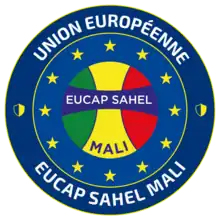European Union Capacity Building Mission in Mali
Context
EUCAP Sahel Mali is a European Union civilian crisis management mission in Mali, with its headquarters in the capital Bamako. It is a non-executive capacity building mission that was launched on 15 January 2015, following an official invitation by the Malian government. The Mission supports the security sector reform and the strengthening of governance and accountability of the Malian internal security forces (ISF).
 | |
.svg.png.webp) | |
| Abbreviation | EUCAP Sahel Mali |
|---|---|
| Formation | 15 January 2015 |
| Headquarters | Bamako ( |
Head of Mission | Peter Grabow Kolding ( |
Parent organization | European Union |
Budget (2023-2025) | Around EUR 70 million |
Staff | 203 authorised personnel (133 international and 70 local staff) |
| Website | https://eeas.europa.eu/csdp-missions-operations/eucap-sahel-mali_en |
Mandate
EUCAP Sahel Mali supports the implementation of the security sector reform led by the Malian government by providing strategic advice, mentoring, training and material support to the National Police, Gendarmerie and Guard and the relevant ministries. The Mission implements its mandate following three lines of operations, which focus on strengthening the ethical standard of the internal security forces as well as strengthening their structural and operational capacities.
The Mission notably contributes to strengthening the capabilities of the ISF in the areas of crisis management, border management, counterterrorism and fight against organized crime, human resources and logistics management, rule of law and the fight against impunity. The mission supports the collaboration between the ISF and the civil society, and promotes human rights, gender equality and accountability of the ISF.
Operational priorities
In January 2023, the European Council extended the mandate of EUCAP Sahel Mali until 31 January 2025, adapting the Mission’s structure and activities to the evolving operational environment and the needs of its partners, pursuing the EU’s Sahel strategy and the regionalization approach, aiming to:
- improve the operational efficacy of the internal security forces;
- re-establish the hierarchical chains of the ISF through a more coherent management resources;
- reinforce the role of judicial and administrative authorities, contributing to the prevention of corruption and impunity;
- facilitate the redeployment of the ISF to central Mali (if conditions allow) and facilitate their deployment in southern Mali, focusing on the National Police; and
- support the redeployment of civilian administrative authorities to central Mali based on good governance principles.
Coordination with Malian and international partners
The Mission works and coordinates its activities with the Team Europe (EU delegation, EU member states and the EU training mission in Mali), Malian authorities and other local and international partners to ensure a harmonized and coherent approach to security sector development, and to contribute to improving stability, security and development in Mali and the wider region. The Mission is administratively responsible for the Regional Advisory and Coordination Cell based in Mauritania, which deploys EU experts to Burkina Faso, Chad, Mali, Mauritania and Niger.
Organisation
Since 11 April 2023, the Head of Mission is a Danish diplomat, Peter Grabow Kolding.
From 15 January 2021 to 31 January 2023, the Head of Mission was Commissaire Général de Police Hervé Flahaut.
From 1 October 2017 to 31 December 2020, the Head of Mission was French Gendarmerie Officer Philippe Rio.
The first Head of Mission was the German diplomat Albrecht Conze.
References
- "Consolidated text: Council Decision 2014/219/CFSP of 15 April 2014 on the European Union CSDP mission in Mali (EUCAP Sahel Mali)".
- "About EUCAP Sahel Mali | EEAS". www.eeas.europa.eu. Retrieved 10 October 2023.
- ""Strengthening links with the communities to improve security" is one of the key objectives of EUCAP Sahel Mali's community policing training courses | EEAS". www.eeas.europa.eu. Retrieved 10 October 2023.
- "Politique de sécurité et de défense commune (PSDC): l'UE renforce ses missions civiles afin de mieux faire face aux crises dans le monde".